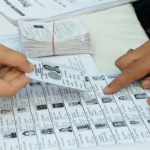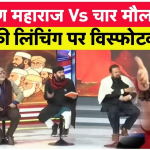Murder and Lynching, India’s New Normal
14, Oct 2014
By Teesta Setalvad
Yesterday (October 13), as I sat down to write this column, my colleague alerted me with this news: Harassed Muslim fodder seller sets himself ablaze in Punjab. The news bulletin on Times of India was from Bhatinda. A Muslim man, who had been selling fodder outside a cow shelter, set himself on fire on Monday afternoon after being harassed by an employee of the gaushala. Having suffered nearly 40% burns, Eid Mohammad (35) recorded his statement before a magistrate and said he was being harassed for the past week because he was a Muslim selling fodder. He has accused the employee of insisting that he move away from his spot on the Bathinda-Dabwali road.
Our politicians, especially the uncultured Culture Minister who has direct access to the very top echelons of government will say that maybe the man who set himself ablaze needed psychiatric help; that it was not communal, and to call it communal is to mistake the wood for the trees. Lynching is spontaneous, say the Sharmas, the Baliyans, the Soms and the Modis; but protest against it, giving succour and help to the family of Mohammed Akhlaq, and his oh-so-dignified son Sartaj is “political.”
We, in the feminist movement, have always believed that the personal is political. The choices we make, the way we live our lives, how much remuneration we give our domestic help, whether they are given provident fund or not. But today, we live in an India where lynching, violence and hatred is the norm; a norm set by the very top.
We did a quick calendar mapping of the Hate and Beef Lynching Violence since July 2015. Here’s what the mapping (on a quick and superficial read) shows. After reading it, I let you readers decide whether or not the fact that a certain mindset, divisive and hate-ridden, that drives the central government, has given free reign to the cadres of the core organisations of the RSS-VHP-Bajrang Dal to literally “take law into their own hands.”
After Dadri lynching, mob sets van on fire in Maharashtra for carrying beef, a news item updated on October 6 tells us. Th news further reads: “Just a week after the brutal Dadri lynching in Uttar Pradesh over beef rumours, a mob of more than 100 people reportedly set a van on fire in Maharashtra on Sunday as it was carrying beef.” Remember, Maharashtra imposed a beef ban earlier this year, making the sale and consumption of beef (wrongly reported, should have said cow meat) a crime.
Bajrang Dal attacks K’taka cattle trader news item updated on October 9, 2015 says, “Police arrived in the nick of time to rescue Ibrahim Padubidri from a Dadri-Style lynching… A cattle trader in Karnataka had a narrow escape after Bajrang Dal activists attacked him with metal rods and chains on a rumour about a stolen cow even as protests erupt across the country against the lynching of a Muslim man on suspicion of slaughtering a cow. Police arrived in the nick of time in the remote coastal town of Karkala in Udupi district on Tuesday and rescued a barely conscious Ibrahim Padubidri who was returning after buying three cows and two calves from two Hindu farmers.”
Anti-slaughter activists thrash, tonsure 4 in Madhya Pradesh reads an item published on September 3, 2015 from Bhopal. It reads : “ Four persons, including two farmers, who bought cattle from a weekly fair in Sanawad town were thrashed and partially tonsured allegedly by members of a right-wing group near Khandwa. Members of a Gauraksha Samiti — cow protection group — stopped two pick-up vehicles and accused Sanjay Gurjar, Shubham Tulsidas, Somchand Gurjar and Karan Yadav of carrying cattle for slaughter on Monday…’They were stripped to confirm their religion, thrashed and tonsured,” Advocate Rakesh Thapak said on Wednesday ,after securing bail for his clients who were charged under the state’s anti-cow slaughter Act.
The Indian Express that broke the Dadri story nationally, reported on August 5, 2015 that three men, Arif, Anas and Nazim — were beaten to death by villagers in Dadri district, suspecting them to be cattle thieves a good 24 days before the Dadri lynching that is now national news. How come the story did not get traction ? How come we did not condemn it the same way as Dadri? Here is what the reporter Aditi Vatsa wrote: “On Sunday morning, 20-year-old Raziya was waiting for her husband to accompany her to a wedding when she received a phone call, informing her about his death. Cradling her two-month-old daughter, Raziya extends a henna-dyed hand and says, “We were supposed to attend a family wedding. The last time I spoke to him, I had been applying henna and I had asked him to reach home on time. I was preparing for the wedding when I received the news of his death.” In the early hours of Sunday, three men — Arif, Anas and Nazim — were beaten to death by villagers in Dadri district, suspecting them to be cattle thieves. Two days after the incident, police have registered an FIR against the three men. No case on their death has been registered by the police so far. “Did they commit such a gruesome crime that they had to be beaten to death? What kind of law and order does this country have,” asked Sajda, Anas’s mother.
A very good question that Sajda asked. Just as another Sajda asked after her dear 50 year old father was brutally murdered, “ If the results prove that it was not beef, will they bring back my dead father?”
And the day before Dadri shook us out of our stupor, here is more gore.
As reported by the DNA on September 29, 2015, Kanpur: Man lynched to death on suspicion of being Pakistani terrorist. Another chilling tale: “In a shocking case of mob outrage, a 42-year-old Muslim man was killed in Kanpur on Sunday, reports The Indian Express. His fault being that people ‘identified’ him as suspected Pakistani terrorist, according to the police. Nine individuals have been arrested so far. However, police is yet to identify the person who was beaten to death.
According to the report, there was a rumour about the presence of a Pakistani terrorist in the area. As soon as this man was identified, all hell broke loose, with people mercilessly lynching him on the mere suspicion that he is a terrorist. He was attacked with a stick and sharp-edged weapon. By the time police reached the place, which is in the Maharajpur locality of Kanpur, the man was already dead and the mob was trying to dispose off his body. Upon seeing the cops, they fled. According to the police, the person was a Muslim, after physical verification. Cases have been filed in this matter for rioting, rioting with deadly weapon, and murder.
What we have after these gruesome chilling incidents is homilies about the need for Muslims and Hindus to stop hating or killing each other. From the country’s top political leadership. There is not a word against murderous mobs taking law unto their own hands, not a word to abide by the rule of Law and the Indian Constitution. The police now say that gory What’s App images of cows and blood inflamed passions ahead of the Dadri lynching. How come the agencies tell us this after the deaths? Muzaffarnagar, Shamli, Baghpat and Merrit, the violence of 2013 was made possible because of the sprinkling of hatred spewed on the visual-text communications threw up a challenge to law and order authorities by the salacious use of new technology, the Whatsapp. Has any action related to the source of these What’s App creations taken by the Uttar Pradesh home ministry, the central home ministry? Should we not be demanding this?
Finally I end with a plea not just for peace and sanity, rule of law and dialogue. I plead in the words of Justice BG Kolse Patil, who spoke recently and echoed what is in our hearts when he said, that the need of the hour is for an “RSS-Mukt Bharat.” Let us recognise where our enemy lies. Within. Strangling our neighbourhoods, with doses of division and hate.










